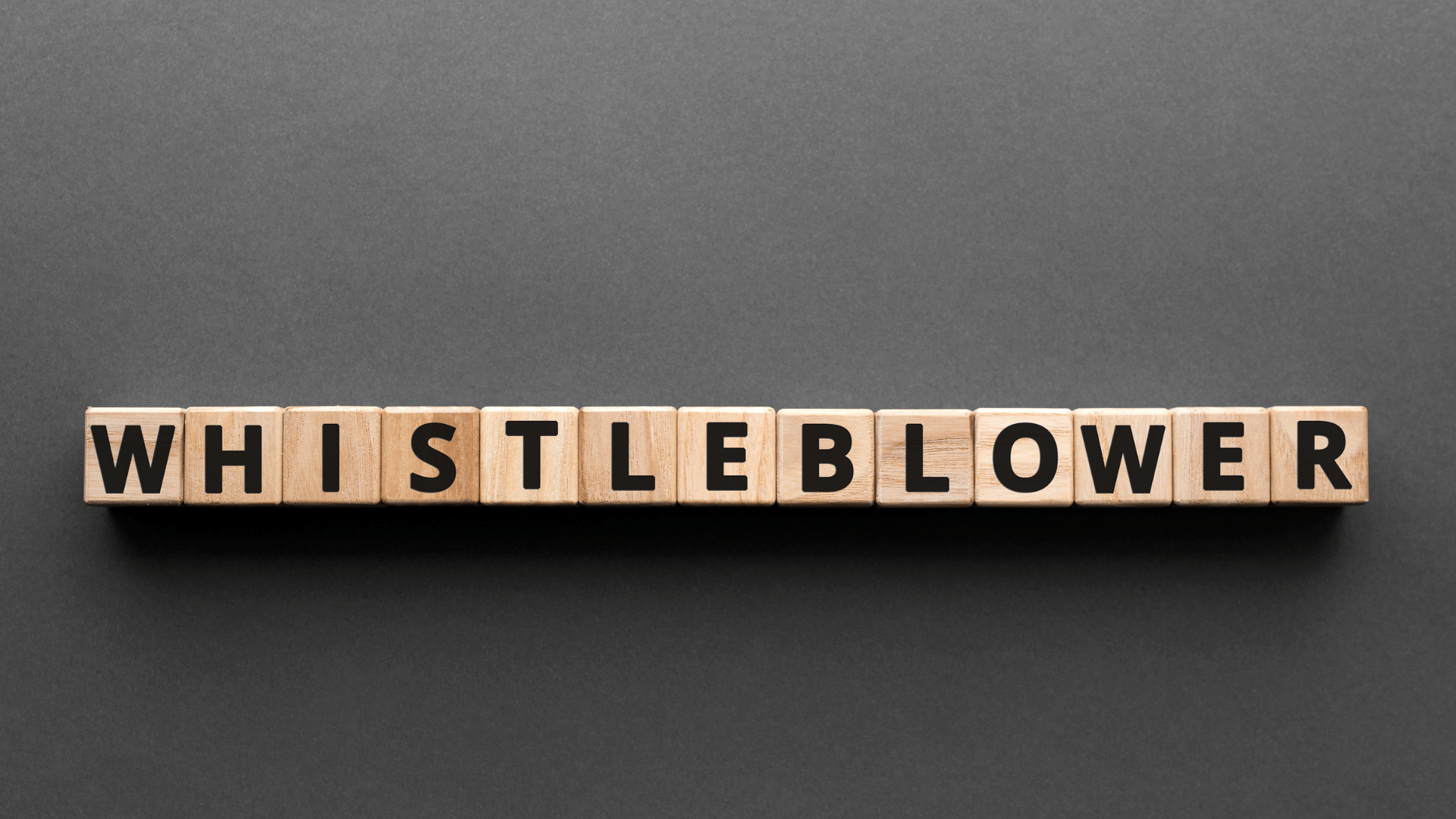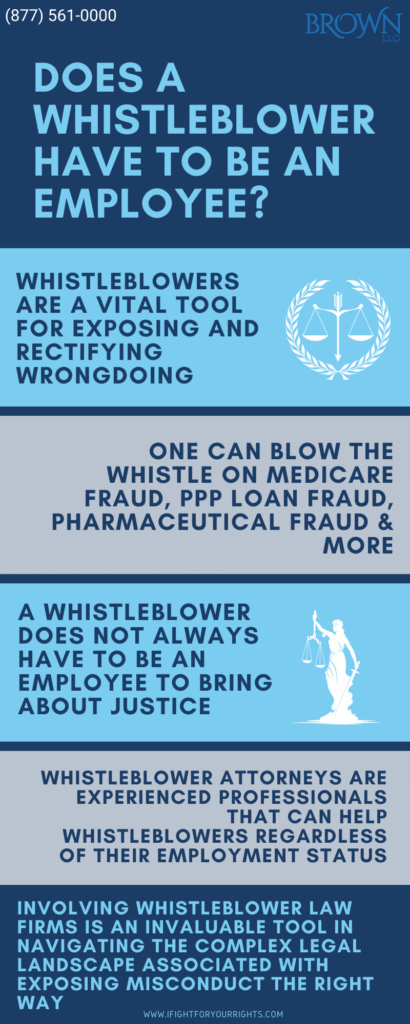Does a Whistleblower Have to Be an Employee?

Whistleblowers are a vital tool for exposing and rectifying wrongdoing, and some people believe that to blow the whistle you need to be an insider, like an employee, but there’s other ways to expose wrongdoing that aren’t necessarily from working as an employee. Prominent whistleblower cases have exposed various instances of fraud including harmful environmental practices, billions of dollars in Medicare fraud using a Medicare fraud whistleblower lawyer, PPP loan fraud, customs fraud, pharmaceutical fraud, defense contractor fraud, Ponzi Schemes, tax evasion, and even the dangers of nicotine and tobacco. As whistleblowers often have insider knowledge of the unethical and illegal practices they are reporting, many are employees of the businesses that were committing the wrongdoing. That said, a whistleblower does not always have to be an employee to bring about justice. A whistleblower could also be a data miner, a patient, an executive, or surprisingly a competitor.
A whistleblower could be a data miner, like in the example of unearthing PPP loan fraud in which an outsider cobbles together information reported regarding the company’s PPP loan application versus other publicly reported information regarding the company or a Medicare fraud data miner showing statistical anomalies regarding prescribing habits. However, if you seek to obtain a whistleblower award, an outsider’s information will have a higher attention to detail in establishing the case as the individual won’t be given the benefit of doubt regarding information that an insider would only know. That’s why executives of the company who have an inside perspective, but are not necessarily employees could be excellent whistleblowers since they are privy to information that could establish the case.
A non-employee whistleblower could also be a patient of a health care practice perhaps giving patients unneeded durable medical equipment (dme), lying about services provided, or falsely justifying cutting edge products for off-label use or impermissible reasons. However, it is extremely hard to commence a whistleblower action based solely on a patient without evidence that fraud is affecting other patients and some indication about the extent of fraud which will be a common litmus question False Claims Act law firms will ask you, so before calling you might want to check online to see if other patients post the same experience that you endured.
Surprisingly, another type of non-employee whistleblowers is that of a competitor. When competitors see a company obtaining an unfair advantage such as engaging in customs fraud to conceal the true origin of goods for evading a tariff to aiding unfairly competition, a whistleblower action could be filed. Additionally, another example might include a healthcare provider or pharmaceutical company in the Medicare space, engaging in prohibited kickbacks thereby siphoning away business from the competitor by using an illegal tactic and when the competitor starts canvassing its lost clientele and discovers that the other business is using an illegal inducement such as a kickback, there will be consequences. Actions such as these may result in unfair competition and compel a whistleblower action to be filed using a pharmaceutical fraud lawyer. There are many important things to know about being a whistleblower before presenting a report–regardless of whether you are an employee or not.
Understanding Whistleblowing
In one sense, whistleblowing is reporting the right information about wrongdoing to the right people. One can blow the whistle on unsafe work conditions, fraud, and consumer safety, among other things. However, in order to have a successful case, the information reported must be squarely grounded in an identifiable statute. Just exposing wrongdoing is not enough unless there is a statutory basis to do so. The individual should also have some indication that the wrongdoing actually occurred; common examples include emails, internal documents, and account records, as well as solely words or testimony of the whistleblower in some cases, but it’s not essential – sometimes just the testimony of the individual could suffice. All the information must then be given in the right manner to the appropriate government body to further investigate the alleged violations by invoking the appropriate statutes and regulations. Only when these steps are followed correctly can a whistleblower effectively report wrongdoing and potentially be eligible for a whistleblower award.
There are many different whistleblower laws across state and federal jurisdictions, with different sectors also having their own guidelines and restrictions. As such, working with a whistleblower law firm can help whistleblowers understand how to best report their case safely. As a general rule, whistleblowers are only protected from retaliation if their actions are in service to reporting wrongdoing. In some instances, relators are eligible to receive some portion of the recovered funds as a whistleblower reward, should there be one at the end of the case.
Speak with the Lawyers at Brown, LLC Today!
Over 100 million in judgments and settlements trials in state and federal courts. We fight for maximum damage and results.
Legal Protections for Whistleblowers
The False Claims Act, the Dodd-Frank Act, and the Whistleblower Protection Act are just some examples of several laws pertaining to whistleblowers that provide protections for whistleblowers in the United States. While these laws differ in their scope and usage, they all share some general provisions designed to protect the rights and privacy of the whistleblower.
For example, when a whistleblower reports a claim under the False Claims Act, it is done so “under seal,” meaning the claim, case, and investigation can remain confidential for potentially many years, and an SEC whistleblower case specifically could potentially stay anonymous from start to finish with an SEC whistleblower attorney. Additionally, depending on the statute, the whistleblower is protected from retaliation, and could be entitled to double pay as well as legal fees and costs.
Employee vs. Non-Employee Whistleblowing
A successful whistleblower suit generally has strong corroboration. Some guidelines for evidence are that it should be specific and cannot be knowledge that is publicly available. While this often means that whistleblowers are employees, they do not necessarily have to be, as non-employees, contractors, volunteers, and even corporations can report wrongdoing under the False Claims Act as long as they do so the right way.
Working with a Whistleblower Attorney
There are many legal obstacles and overlapping policies that make navigating a whistleblower case difficult. The role of a whistleblower attorney cannot be overstated. Whistleblower attorneys are experienced professionals that can help whistleblowers–regardless of their employment status–navigate complex legal terrain. If you are a potential whistleblower seeking to report wrongdoing in your workplace or elsewhere, consult a whistleblower attorney to help organize your documents, file a claim under the proper channels, and argue the claim from filing to settlement.
Finding an experienced whistleblower law firm is critical in the entire process of reporting a claim. It is helpful to look for firms that have a proven track record of success, as they will have the knowledge and connections to ensure everything progresses smoothly. Many of these firms are well-connected with each other, and can help facilitate finding the right attorney for a whistleblower, should the case fall out of their own practice area.
The notion that a whistleblower must be an employee is not true. Whistleblowers help keep people and businesses accountable, and there are strong legal protections to ensure that they can continue doing so without endangering their own livelihoods. Regardless of a whistleblower’s employment relationship, involving whistleblower attorneys and law firms is an invaluable tool in navigating the complex legal landscape associated with exposing misconduct.

